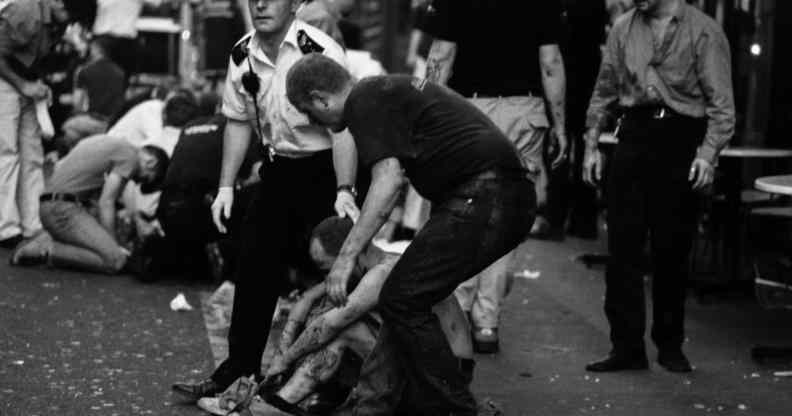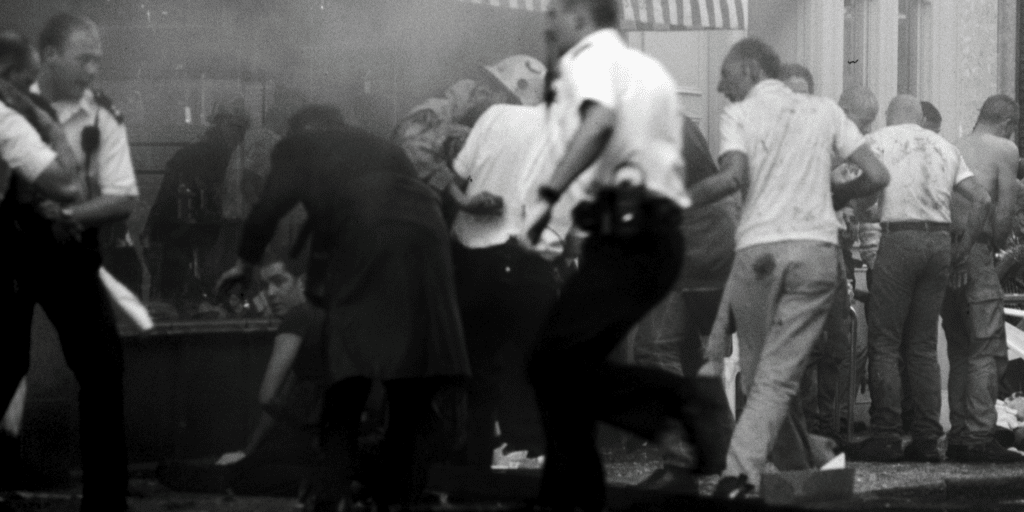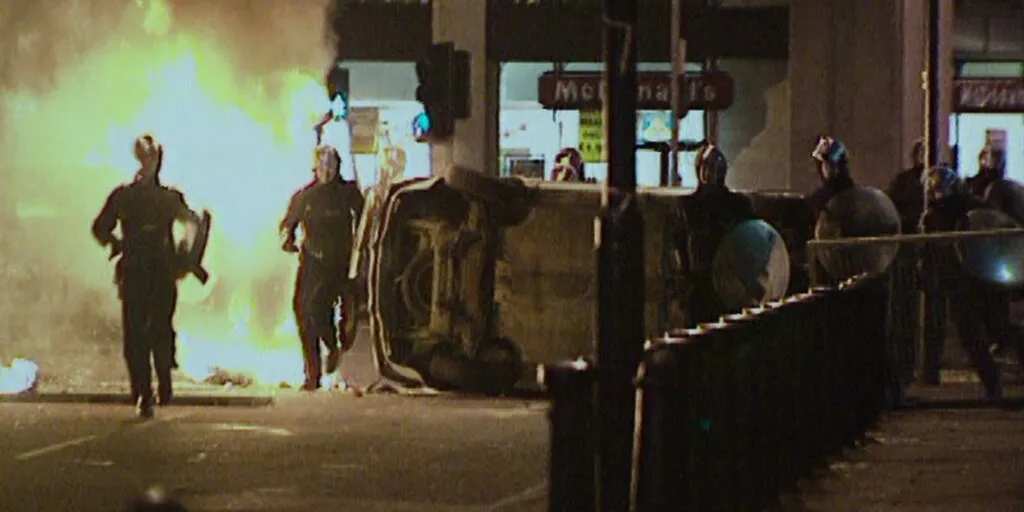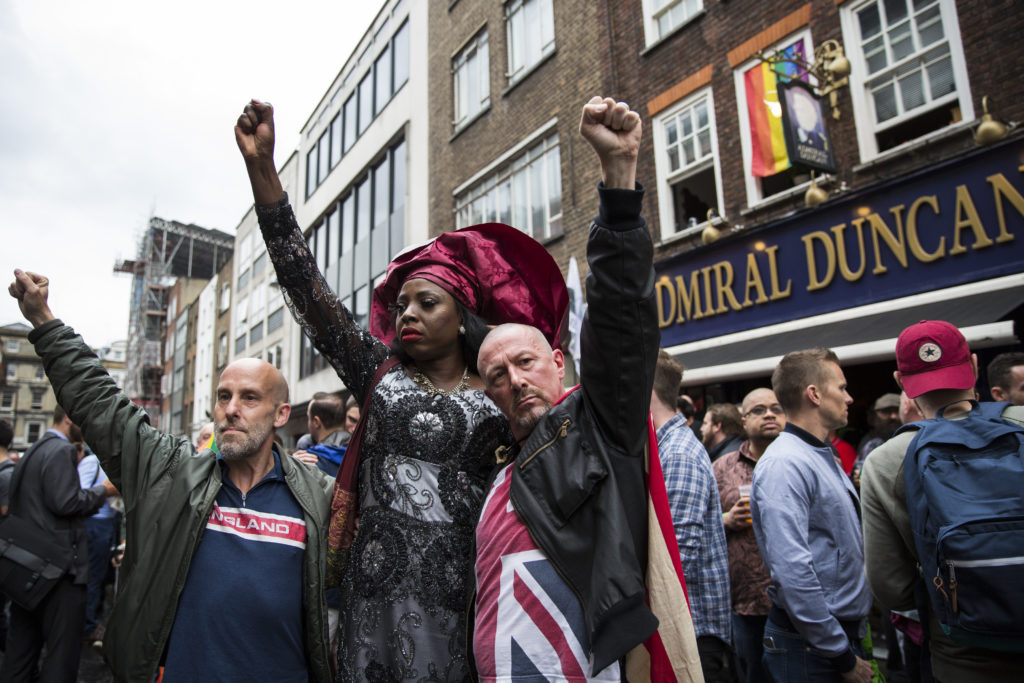Neo-Nazi nail bomber behind heinous Admiral Duncan attack was a ‘banal worthless man’, says filmmaker

The documentary charts the devastation David Copeland enacted. (Netflix)
On 30 April 1999, all Colin Barr could think about was the weather as he made his way to Soho, London, on a Bank Holiday weekend.
It was a limpid Spring evening. Barr, who had moved down to the capital from Glasgow, Scotland, the year before, was off to meet his queer friends for drinks.
He was on edge – only two weeks ago, the streets of Brixton shuddered with the din of a shoebox-sized nail bomb that injured 48 people. He was sure it was a one-off. Nothing to worry about.
Then he watched the news – it had happened again, this time in Brick Lane days later. Thirteen wounded. All he could do was wait. Wary of what, if anything, was around the corner.
But for now, the weather sure was nice, he thought. Barr was due to make his way to the Three Greyhounds, a pub with a mock Tudor exterior that looks like a Microsoft Excel spreadsheet, when it happened.
Just a two-minute-long walk from the pub he was set to see his friends at, an explosion rippled out of the Admiral Duncan on Old Compton Street.
The blast blunted the sense of joy that hung in the air as what was once a blue sky was snubbed by smoke, the wailing of sirens and fire engines soon clogging the streets for miles.

(Netflix)
Seventy-nine people were wounded, four had to have limbs amputated and Nick Moore, 31, John Light, 32 and Andrea Dykes, 27, four months pregnant with her first child, died.
“I was like, ‘s**t’,” Barr recalled of the day to PinkNews. “Everyone’s under attack. It was really scary, particularly for my gay friends.
“They felt like it was such an act of violence and so unexpected in a city like London, and in a place that felt like a safe place, you could just be yourself.
“And I remember they were seized by that. It felt like an attack on all of us.”
More than 22 years later, and Barr, a man with a salt-and-pepper beard and a doughy Scottish accent, was back in Soho.
He was filming Nail Bomber: Manhunt, a Netflix documentary he is the creator and showrunner of that dives deep into why a 22-year-old white nationalist sought to start a race war by carrying out brutal bombings that wounded more than 100 Londoners.
“We felt like there were people who remember the Soho attack, but don’t really remember Brixton and Brick Lane and don’t really know what the whole story was,” Barr said.
“And that there was a generation that was growing up and knew nothing about those two weeks.”
Robin Ockleford, the film’s producer, knows this well. “I was talking to one of the survivors from the Admiral Duncan,” he said, “and he told me a story about him having a drink on Old Compton Street with some younger gay guys.
“He mentioned that he’d been in the [Admiral Duncan bombing], and the younger people were like: ‘What’re you walking about? I’ve never heard of that.'”
Barr, Ockleford alongside director Daniel Vernon, decided to change this. They spoke with witnesses, undercover operatives, law enforcement officials, community leaders, journalists, former members and misfits of white nationalist groups and healthcare workers to tell the story of one man and the pain he caused countless people.
Admiral Duncan nail bomber was a ‘banal worthless man’, says filmmaker
A 22-year-old engineer named David Copeland had ordered a bottle of coke at the Admiral Duncan minutes before the bombing.
As he left the pub, he struggled through the elbows and shoulders of wobbly pub-goers eager to start their weekends. The nail bomb he had placed went off.
“When I was in there, I looked around at all the people I was about to maim and kill,” he later told police. “I didn’t feel joy about it. I didn’t feel sad. I didn’t feel anything.”
Copeland was a Neo-Nazi militant and a former member of two far-right political groups, the British National Party and then the National Socialist Movement. Before that, he was a heavy metal fan who dreamed of being reincarnated as an SS officer.

(Netflix)
He might have been arrested 2 May 1999, but people like Copeland, who let his pet rats defecate and urinate on the nails he stuck in his bombs, are still around, Barr stressed.
“A lot of what a lot of things that made Copeland the way he was are very much alive and kicking today,” he explained.
“In some respects, they might have been maybe arguably even worse today than they were then.”
In piecing together a detailed timeline of the three bombings, Barr’s crew combed through hours of interview recordings of investigators interrogating Copeland after his arrest.
“I have a problem with gays,” Copeland said in one of the police interviews featured in the documentary. “I’m pretty homophobic. I hate them.
“I chose the gays because I hate them. That was personal.” He then closed his eyes in a flash of rage, police described, and added: “I just don’t like them. I just don’t like them.”
Copeland is nothing more than a “banal, worthless human being” Barr said, whose story didn’t have to end in the way it did. He, as some white, low-income men at the time did, felt “angry, left behind and sought to belong to something”.
Arthur also seemed pretty ordinary too when Barr met him. He was anything but, though – Arthur was a man who spent more than a decade inside far-right fascist groups in Britain.
The intelligence Arthur gathered proved crucial to cops finally identifying Copeland, and his story came to be one of the most eye-opening things about making the documentary, Barr said.
“He is a proper, ordinary British hero”, Barr said of the man who, in the documentary, is a hooded figure cloaked in shadow.

Arthur, an undercover informant, as seen in Netflix’s Nail Bomber: Manhunt. (Netflix)
“He didn’t do it for an award or recognition and never really talked about it in detail before,” he added. “As long as there are Arthurs in the world, then hate will never win.”
The kind of hate Copeland embodied can be difficult to put into words, Ockleford said. As he described Copeland’s “reckless” and “careless” violence, he tripped as if someone was twisting balloon animals out of his tongue.
“I’m struggling to articulate this,” he admitted.
“In Brixton, Copeland assumed everybody would be Black and that was the target for his hate. He was surprised to find out that it was a mixed community with people from all sorts of different places, living happily, side by side, that was a shock to him.
“That kind of lack of understanding about the real world that he obviously had was sort of a shock when I when I learned about that.”
The police also struggled to understand. Throughout the documentary, community leaders voice their grievances of a force that seemed almost sluggish to come to the conclusions they almost immediately did: That the bomber was targeting them for being of minority groups.
“There was a real lack of sensitivity and awareness then,” Barr said, “which has improved to some degree but only to some degree. A lot of these communities still feel under-protected, over-policed.”
On what he would say to Copeland if he ever had the chance to speak to him, Barr, wagging a pencil as if he were a teacher holding a whiteboard pointer, said he’d show him Nail Bomber: Manhunt.
“To look those people in the eye and see whether he made any difference,” he said. “To see their humanity and see them as people – how he dealt with it was to think of them as just a mass of difference.”
When Barr spoke of the sense of tragedy that ripped into some of London’s most marginalised and vulnerable communities, his once soft voice stiffened, as though edged in concrete.
“In a city like London, people never thought that that could happen,” Barr said. “People would never entertain the possibility that that could happen.
“Beyond that, I think something was absolutely gained because the police were forced to learn some lessons.

The Admiral Duncan continues to be a place for the LGBT+ community to come together and remember those they’ve lost. (Jack Taylor/Getty Images)
“And I think that those communities were galvanised and unified and bound together in a way that made them stronger.
“When we look back at those things, if you look back at memorialising the Admiral Duncan, for example, every time that moment is memorialised, people come together, the opposite of what Copeland wanted.
“And every time that happens, Copeland loses a bit more.
“In the end, the effect of Copeland’s horror was to build bridges for people – not to pull them apart.”
Nail Bomber: Manhunt is out on Netflix 26 May.

